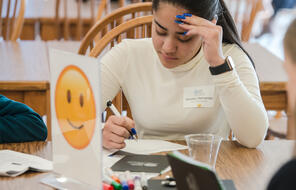Breadcrumb
Teaching The Children of Willesden Lane: Gaining Insight Through Poetry
At a Glance
Language
English — USSubject
- English & Language Arts
- The Holocaust
Teaching The Children of Willesden Lane: Gaining Insight Through Poetry
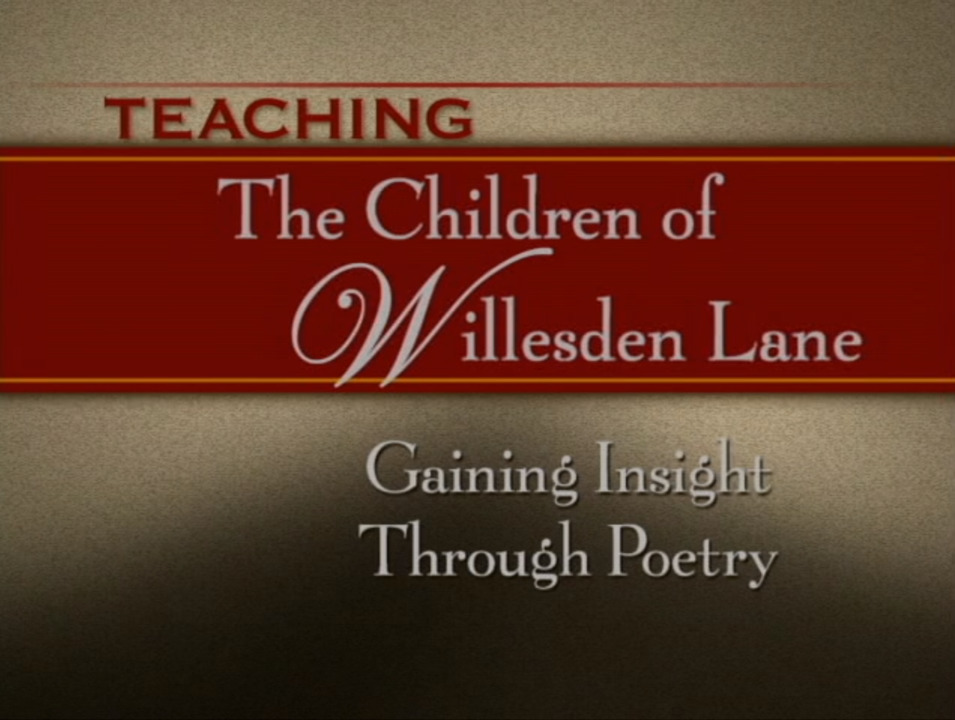
[MUSIC PLAYING]
Today, what we're going to do is look at a poem that you've not seen thus far, and we're going to practice some of the elements of copy change on that poem so that you folks can see if you can make it into your own. And what I'd like to do is to read it, look at it, and then somebody will read it aloud for us, maybe Tisha. You can read it aloud for us. And then we're going to just have some general dialogue regarding the poem.
And we're going to talk about its relationship to The Children of Willesden Lane because that's where we'll start with our discussion. And then we'll move it into our own world. The best part about The Children of Willesden Lane is that it's a book that every student that has read it in the school has found some connection to it whether it be a character or a particular situation or one of the more universal themes where there's a sense of discrimination. And it just fits neatly into the classroom.
And it's not just the story about the Holocaust. It's a story about a particular person's life and how she triumphed over all of the adversity that she had to face at that time.
Will they ever learn? As I look down on this world of mine, several questions cross my mind. Why do they stare when I walk through the hall? Why did they think I can run with a ball? Why do they think I swear all the time? Why do they think I'll resort to crime? Why do they think I like to fight? Is it because I'm dark not light?
I hear them talk behind my back about my skin because it's black. Too Black to be friendly, too Black to be smart, don't they know it breaks my heart? To hear them tease without my concern, I wonder if they'll ever learn.
Thank you. Take a minute now and read it again to yourself. And as you're reading it with your pen in your hand, try to underscore any of the words that you see in there that might grab your attention right away, that might give you a feeling about how this person is feeling. And then we're going to talk about it a little bit, and then we're going to see if we can copy change it.
The copy change that I do in my classroom consists of the students getting an original poem, and they take the poem itself, the form, adding their own ideas, their own words, but staying strict to the form. Eventually the goal is to break away from the copy and to start importing your own ideas and bringing your own self into that piece of writing.
Let's see if we can talk about some of the things that maybe you underscored in this and why.
Breaks my heart.
It breaks my heart. Why?
Because it shows that people don't have a general concern for others. They take everything for face worth, and they don't look inside to see what others are feeling.
So having some empathy towards the other person, the outsider, and specifically to The Children of Willesden lane, we could say, Lisa, your own personal feelings of being a teenager, being Jewish, or you can take it globally and look at anybody's position in society, in any society, how a person would feel. Good. Anything else?
Why do they stare?
I was waiting for somebody to jump on that. Why is that line significant? How might that person feel do you think?
Lost, lonely, deserted probably because he-- this person wants to fit in with everybody else. But with them staring at them and he feels or she feels that there's nothing left, there's nobody there for that person.
Good. So there's a sense of loss of hope and isolation. One of the themes in our human condition is how the other feels. How many people have ever been stared at before? When would have been stared at?
When I transferred here. People didn't know who I was, and they were curious. They just-- they wouldn't ask me right out where are you from.
And how did you feel about that? How did that make you feel? Did you feel--
Upset.
Upset. Isolated?
Yeah.
And how do you overcome something like that?
I started talking to people on my own, telling them who I was and--
Who might have written this poem?
A Black man probably.
Why a Black man?
Because when it says I can run with the ball, that reminds me of football. And usually girls don't play football.
Any other indicators of who the writer might be? Erica?
A young person because young people are usually more concerned with other people-- with what other people think of them and how they treat them.
Does that ever carry though into adulthood?
Yeah.
Because we have discrimination on all levels, don't we?
Yeah. But I think it's more prevalent because you care more when you're younger, but as you get older you get used to it and learn how to deal with it better.
Good. I'm going to ask you to copy change this poem, and I'm going to give you the themes that you're going to work on. So--
I picked themes from The Children of Willesden Lane, and I also added themes from the class-generated discussions about the other and the human condition that we had been working on all year. So I wanted to meld them together.
Why do they stare so coldly at me?
Coldly or coolly?
Coldly because it's coldly here.
Many of them are very reluctant to take the pen to the page to write a poem, but with this, it's not a fill in the blank but there's a form to follow. There's something that they can work with instead of just the blank page.
What's our theme here?
The doctor patient.
OK, so which position are we going to take?
The patients.
The patients.
What could you do with that? What--
We could put the patient in the hospital room like awaiting what the test results are. And then the doctor telling the patient or how they feel, their point of view.
Donald?
Well, you could just show sometime during the poem maybe that this doctor is not showing concern, like, not basically, it's stuff from the patient's perspective.
OK, so stay with the patient. OK.
So we could start off with like sitting here in the hospital room. The doctor should be here soon or something like that.
That's kind of how it is here.
Yeah, it is like that.
Too old to be open-minded. Too old to care.
We would bounce ideas off each other. We were trying to keep the rhyme. So we would come up with the first line. And then we'd have to try and think of words to rhyme with the last word in each line. So we were coming up with words and trying to think of what would make sense with it.
I want to hear from you some of the frustrations or challenges of this particular poem or the themes that you've had to deal with.
To visualize my poem, my theme, was very hard for me because I know she's been through a lot.
She?
Lisa.
OK.
Been through a lot. And I couldn't imagine all the pain and suffering that she went through. So it was really hard for me to sit and think well, her being on the train by herself and how she would felt and things that's running through her mind of her leaving her family. It was really hard to try to put it together into a poem.
Good. I'm going to ask two groups to read their poems. Justin?
As I go through the city of mine, several questions cross my mind. Why is there a soldier outside the gate. Why does he look at me with such hate?
Doesn't he know I'm here to learn? Doesn't he know music is what I yearn? Why am I treated so differently? Is it because I'm Jewish, not Nazi?
I feel them stare as I walk by. It drives me to the point where I want to cry. Too hated to be won. Too hate it to be strong. Don't they know what they're doing is wrong? When those looks they give me make my stomach churn, I wonder if they'll ever learn?
Comments?
It's good.
It was really good.
What about it? What makes it so good?
I don't know. Just the way they made it rhyme and the words that they did use. You could really tell what part of the book they were referring to.
Which part is that?
When she's going to her piano lesson.
In the very beginning of the book?
Yes.
Good. Very good.
When I try to picture myself in her position, I try using the way I felt when I was getting made fun of or laughed at. And I try to format that to how she felt being discriminated against and being sent away by her family, just so she wouldn't get hurt or taken into one of the camps. And I just build on my own feelings to how I think she would have felt.
Are there any other scenes that any of you remember from the beginning of the novel that could easily have been copy changed into this poem?
I definitely think the night of Kristallnacht would be a good night to copy change and see [INAUDIBLE].
Yeah, anybody want to add to that?
I don't think that it would be fair to the people who experienced it to try to express such emotion from such a night that we can't even comprehend. It's not fair to those people for us to write about what they experienced because it's so awful and so unbearable and unexplainable.
I think they would be happy to have somebody to try and see how they felt, to step in their shoes and try and understand. I don't think they would feel offended that somebody was trying to understand how they felt. I think they'd be happy.
By saying that that wouldn't be fair to do, it would be like saying that it wouldn't be fair to try to embody any of the situations in the book because we can never feel what they felt. We could only try. So if that's all we could do.
I think that it would be kind of hard to copy change that because it'd be hard to find something to compare that to that would have that same type of emotion.
But if you really think about that, then you can't write about anything that you've never been to. Like, you wouldn't be able to write about anything that ever happened unless it happened specifically to you or affected you in a specific way.
Ah, good.
Now, I just want to see what you guys came up with your poem. What is your theme?
Our theme was the only white person living in a neighborhood of either African Americans or Hispanics. And we took it as an elderly person who wasn't racist. But everyone in the neighborhood thought they were.
Give it a try here.
As I look down on this world of mine, several questions cross my mind. Why do they stare when I cut my grass? Why do they think I am old and crass?
Why do they think I cannot stand their race? How could they be so off-base? Why do they think I have a racist tongue? Is it because I am old, not young?
I hear them talk behind my back because of the youth I lack. Too old to be open-minded, too old to care. Don't they know that this is unfair to treat me this way. I wonder if they'll understand someday.
Very good. Comments?
I really liked it because it shows that stereotypes are just a common misconception and that the other can be anybody. And who you usually think would be the other can be the person who is the discriminator, like, the person who is making other people feel--
How uncomfortable.
Yeah.
Yeah, their presence and so forth.
The other, to me, means pretty much what it says, somebody that's not you. Anybody else, somebody that's living a situation that you never have and probably never will. And you can't really understand it. But you want to try. And so you write a poem from the other's point of view to become more open-minded and understanding.
If you can't put yourself in the situation and try and feel what they felt, then you're not learning anything from it. Trying to understand the emotion is half the battle.
The Children of Willesden Lane represents a challenge because of the themes that it could provoke, the thoughts, the discussions that it could provoke. And if a teacher is confident that he or she has the training to make a discussion or dialogue happen in the classroom, he should. And he should use it in a way to facilitate discussion.
[MUSIC PLAYING]
Teaching The Children of Willesden Lane: Gaining Insight Through Poetry
You might also be interested in…
Holocaust and Human Behavior: A Facing History & Ourselves High School Elective Course
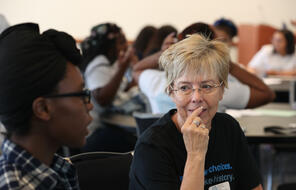
Identity and Storytelling
Three Good Things

Slow Down with The Slowdown

Take a Stand
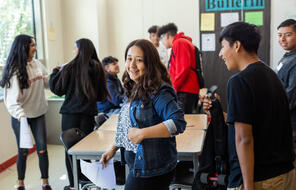
Appreciation, Apology, Aha

Closing Challenge
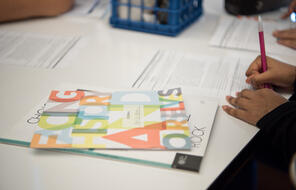
Looking Back, Looking Ahead

Our Names and Our Place in the World

Making Meaning of Community

Emoji Emotions
